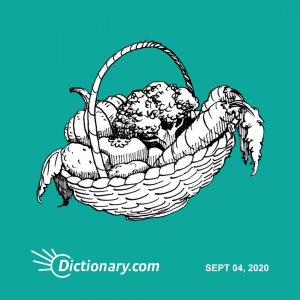Word of the Day
squib
noun
a short and witty or sarcastic saying or writing.
More about squib
The noun squib, “a short and witty or sarcastic saying,” dates from the end of the 16th century, a development of its original sense, “a small firework that burns with a hissing noise but doesn’t explode.” The word has no definitive etymology, but it is most likely onomatopoeic. Squib entered English in the first half of the 16th century.
how is squib used?
After Bush pulled off his carrier stunt before an awestruck cable universe, Maureen Dowd dipped her fingernails in the old acid and banged out a memorable squib questioning the Top Gun’s swagger …
Throughout it all, he found one way or another to seize the gaze of the media, often by slipping to the press short bits of provocative writing, then known as squibs.
squib


scherzando
adjective
(in music) playful; sportive.
More about scherzando
Scherzando, “playful,” is an adjective used in music. Like many musical terms, scherzando is of Italian origin, it being the gerund of the verb scherzare “to joke.” The noun scherzo, “a musical movement or passage of light or playful character,” is another derivative from the verb. Italian scherzare is most likely a borrowing from Middle High German scherzen “to jump for joy, enjoy (oneself).” Scherzando entered English in the second half of the 18th century.
how is scherzando used?
The scherzando character is expressed in rapid gestures high on the guitar, with mercurial changes of tone color, perilous slides, and abrupt silences.
After the opening section in the scherzando mood that Rachmaninov does so wonderfully, he presents us with this gorgeous melody.
scherzando


olericulture
noun
the cultivation of vegetables for the home or market.
More about olericulture
Starting from the end, the –iculture of olericulture “cultivation of vegetables for the home or market” is familiar to us from compounds like agriculture “the cultivation of land for crops,” and the relatively recent apiculture “beekeeping, especially commercial beekeeping.” The first part of olericulture comes from oleri-, the inflectional stem of the Latin noun olus (also holus) “a vegetable, vegetables, kitchen herb,” which is related to the adjective helvus “yellowish, dun (of cattle).” Helvus is the Latin result of the Proto-Indo-European adjective ghelwos “bright, yellow,” a derivative of the Proto-Indo-European root ghel– “to shine,” a root that is particularly associated with colors. Latin has another adjective gilvus “yellowish” (used of domestic animals), a borrowing from a Celtic language. Much, much closer to home, ghelwos becomes gelwa– in the Germanic languages, the source of English yellow. Olericulture entered English in the second half of the 19th century.

how is olericulture used?
… he offered his 7-year-old grandson a daily tutorial in olericulture in his backyard field of bounty.
As either a lecture or a recitation course alone olericulture is not likely to prove a shining success. It should be accompanied by a definite laboratory course, in which the actual materials of the garden may be studied first hand.
olericulture





